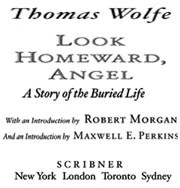Look Homeward, Angel

Praise for Look Homeward, Angel
“Look Homeward, Angel is a big book and contains multitudes. Among them is a deep sense of place for the town of Asheville, where Wolfe grew up. I was born in Asheville, though I grew up in a town eighty miles more remote and fifty times smaller, but where a bowl of old blue mountains equally ‘rimmed the heart of the world.’
When my father was a young man, he saw Thomas Wolfe walking down Patton Avenue, towering over the people mobbing him. Not an angry crowd, though I’m quite sure angry and resentful citizens existed, as biographies insist. But what my father saw when Wolfe came home again was adulation. Much later, in the ’60s, my father was a friend of Fred Wolfe — Luke in Look Homeward, Angel. When I was seventeen and obsessed with Thomas Wolfe’s writing, my copy of his second novel — Of Time and the River — had endpapers filled with Fred’s handwritten recollections of how one scene actually happened. Comparing the two accounts, it seemed to me that what brother Thomas had written was much more real in every way I could understand than mere fidelity to fact.
In 1938, after Thomas Wolfe was buried in Riverside Cemetery, famed Scribner’s editor Maxwell Perkins asked to be driven to a place where he could overlook Asheville before his train left for New York. I live up the mountain from where Perkins stopped, and some days as I pass the likely spot where he admired the vista, I remember the town more like Perkins saw it, as it was when I was a boy, before the construction of hideous modern bank buildings wiped out entire blocks of town and before four-lane roads cut mountains in half leaving raw wounds that will not heal in a thousand lifetimes. I look across Asheville to the western mountains and wonder what books Wolfe might have written in the ’60s when he would have been in his sixties. Whether Asheville might still have meant anything to him or whether he would long since have left it behind.
Thomas Wolfe sometimes wrote ten thousand words a day. Maybe that’s real or maybe it’s legend. Ten thousand words amounts to about forty pages in real money. Imagine ending the day with forty new pages spilled with language as rich and ambitious and intensely American as any of our novelists has ever accomplished. And he was one of us.”
— CHARLES FRAZIER,
author of Cold Mountain
and Thirteen Moons
“Look Homeward, Angel is one of the most important novels of my life. It was the first literary adult novel I ever read; I was fourteen and aching to become a writer, and it set me on fire. It’s a wonderful story for any young person burning with literary ambition, but it also speaks to the longings of our whole lives; I’m still moved by Wolfe’s ability to convey the human appetite for understanding and experience. His hometown of Altamont is my hometown of Asheville, and although Asheville has changed a great deal since he first observed some of my ancestors (among many other characters) there, I still catch a whiff of Altamont when I go home again. To even think about Wolfe’s prose is to see the world through its lens for a moment. Read it in spring by an open window.”
— ELIZABETH KOSTOVA,
author of The Historian
“I have needed to write the American novelist Thomas Wolfe a love letter since I first encountered him in Eugene Norris’s high school English class at the end of 1961. The book’s impact on me was so viscerally powerful that I consider the reading of it as one of the pivotal events of my life. It starts off with the single greatest, knock-your-socks-off first page I have ever come across in my careful reading of world literature, and I consider myself a small-time aficionado of wonderful first and last pages. The book itself took full possession of me in a way no book has before or since with the possible exception of Of Time and the River. I read it from cover to cover three straight times, transfigured by the mesmerizing, dazzling hold of the narrator’s voice as I took in and fed on the awesome power of the long line. I realized that breathing and the written word were intimately connected to each other as I stepped into the bracing streams of Thomas Wolfe and could hear the waterfalls forming in the cliffs that lay invisible beyond me. I kept catching myself holding my breath as I read Look Homeward, Angel. I had not recognized that the beauty of our language, shaped in sentences as pretty as blue herons, could bring me to my knees with pleasure — did not know that words could pour through me like honey through a burst hive or that gardens seeded in dark secrecy could bloom along the borders and porches of my half-ruined boyhood because a writer could touch me in all the broken places with his art.”
— PAT CONROY,
author of My Losing Season
“When I was in the seventh grade a teacher noticed I was reading widely but, he judged, not too well. I was reading Zane Grey and Erle Stanley Gardner, Mickey Spillane and Erskine Caldwell. ‘You’re all width and no depth,’ he told me. The next day he presented me with the Modern Library edition of Look Homeward, Angel.
1 comment